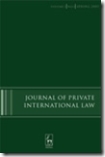Continuing the trend of interesting private international cases coming out of the patent and copyright fields (see previous posts here and here), the Second circuit recently decided a case involving the enforcement of a French judgment involving copyrighted dress designs.
In Sarl Louis Feraud International v. Viewfinder, Inc., 2007 WL 1598057 (2d Cir. June 5, 2007), a French court held, by default judgment, that Plaintiff’s copyright in the actual design of dresses was infringed by Defendant’s taking photographs of them and placing them on a website. Enforcement was sought in the U.S. under New York State law. Judge Lynch refused to enforce the French judgment on the grounds that it would be repugnant to the public policy of New York as it would violate Defendant’s First Amendment rights. 406 F. Supp. 2d 274 (S.D.N.Y. 2005). Lynch said it was obvious that Defendant’s activities fall within the protections of the First Amendment, because they are “matter[s] of great public interest, for artistic as well as commercial purposes. . . . [T]he extensive coverage given to such events in various mass media makes clear that there is widespread public interest in these matters.”
Judge Lynch said a conflict arises when U.S. courts are asked to enforce judgments from countries that do not have First Amendment protections.
“Many democratic countries, which share our general commitment to human rights and maintain free and open societies in which freedom of speech and thought is fully respected, differ from us in the resolution of certain questions involving the balance between freedom of expression and the maintenance of ordered liberty, particularly in areas where freedom of expression may be in tension with the protection of other human rights, such as equality or human dignity. . . . Even in those areas, however, where reasonable people and decent societies may reasonably disagree, American courts have recognized that foreign judgments that run afoul of First Amendment values are inconsistent with our notions of what is fair and just, and conflict with the strong public policy of our state.”
The judge noted that the First Amendment protects speech that can be banned in other democratic countries, and courts in the United States have refused to enforce foreign judgments such as one that restricted access to Nazi propaganda in France. American courts also have refused to recognize English libel judgments that would be inconsistent with the U.S. Constitution or the laws of the states.
The Second Circuit just reversed, 2007 WL 1598057 (2d Cir. June 5, 2007). The court began by noting the rule of comity inhering to default foreign judgment, and held that, “for the purposes of this action, we must accept that Viewfinder’s conduct constitutes an unauthorized reproduction or performance of plaintiffs’ copyrighted work infringing on plaintiffs’ intellectual property rights, and the only question to consider is whether a law that sanctions such conduct is repugnant to the public policy of New York.” In so considering, however, the Court held that Judge Lynch had not “conducted a full analysis” of the issue.
In particular, the Second circuit refused to allow Defendant to rest its defense entirely upon its status as a news magazine covering a public event. Because “[i]ntellectual property laws co-exist with the First Amendment in this country, . . . [t]he First Amendment does not provide such categorical protection.” Rather, in deciding whether the French Judgments are repugnant
to the public policy of New York, the district court should:
“first determine the level of First Amendment protection required by New York public policy when a news entity engages in the unauthorized use of intellectual property at issue here. Then, it should determine whether the French intellectual property regime provides comparable protections.”
On the first prong of the test, the court directed exclusive use of the “fair use doctrine,” which “balances the competing interests of the copyright laws and the First Amendment” under a four-factor test. Because the district court analyzed the “fair use doctrine” in a single sentence, and the record as it stands was insufficient for the court to decide it here, the decision was vacated and the case remanded to be addressed on a “fully-developed record.” The court also directed a more in-depth examination of the second prong of the analysis under Fed. R. Civ. P. 44.1, i.e. “the manner of protection afforded plaintiff’s fashion shows by French law.”
Because the court seemed to place any First Amendment defense to foreign judgment enforcement exclusively within, and not in addition to, the “fair use doctrine,” Commentators have already acknowledged that “[t]his is a major decision.” The court also seems to acknowledge that, if Judge Lynch concludes that Defendant’s use of plaintiff’s intellectual property would be fair under U.S. law (regardless of whether it would be permitted under French law), then the judgment cannot be enforced.
 The
The  The first issue for 2007 of
The first issue for 2007 of 